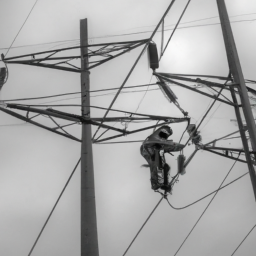Have you ever wondered what it’s like to work atop soaring power lines, battling the elements and ensuring that electricity keeps flowing smoothly? Look no further than the exhilarating career of a lineman. From climbing towering poles to repairing electrical systems, this dynamic profession offers adventure, skill development, and a chance to contribute to the smooth functioning of our modern society. Join us on a thrilling journey as we explore the exciting world of a lineman career, diving into the challenges, rewards, and unique experiences that await those who choose to embark on this high-voltage path.
What is a lineman career?
Definition of a lineman
A lineman is a skilled professional who works in the electrical power industry. Their main responsibility is to install, maintain, and repair power lines and electrical equipment. They often work on high-voltage transmission lines that carry electricity from power plants to substations, as well as distribute electricity to homes, businesses, and other facilities. Linemen play a crucial role in ensuring a reliable supply of electricity and keeping communities powered.
Types of lineman
There are different types of lineman, each with specific responsibilities and job scopes. The most common types include:
-
Transmission Lineman: These linemen focus on high-voltage power lines that transmit electricity over long distances. They work on towers and poles to construct and maintain transmission lines.
-
Distribution Lineman: Distribution linemen work on lower voltage power lines that deliver electricity to residential and commercial areas. They handle tasks such as line repair, installation, and maintenance of electrical equipment.
-
Journeyman Lineman: Journeyman linemen have completed their apprenticeship and are fully qualified to perform all aspects of their trade. They are experienced professionals who can handle various tasks from installation to repair.
-
Master Lineman: Master linemen have extensive experience and expertise in their field. They often serve as mentors, trainers, or supervisors for apprentice and journeyman linemen. Master linemen may also specialize in specific areas, such as live line work or underground systems.
Education and Training
High school education
To pursue a career as a lineman, a high school diploma or equivalent is typically required. While in high school, it is beneficial to take courses in mathematics, physics, and electronics to develop a basic understanding of electrical principles. Additionally, gaining hands-on experience through vocational programs or part-time jobs related to electrical work can provide a solid foundation for a lineman career.
Apprenticeship programs
The majority of lineman training occurs through apprenticeship programs. These programs combine on-the-job training with classroom instruction. Apprentices learn the necessary skills and knowledge under the supervision of experienced lineman mentors. The duration of an apprenticeship can vary but generally lasts around four to five years. During this time, apprentices gain practical experience in tasks such as pole climbing, electrical system installation, equipment maintenance, and safety procedures.
Certification and licensure
Upon completing an apprenticeship program, aspiring linemen may need to obtain certification and licensure, depending on their location. Certification is usually awarded by professional organizations or trade unions and demonstrates a lineman’s competency in their field. Licensure requirements vary by state but often involve passing written and practical exams. These certifications and licenses ensure that linemen meet industry standards and can perform their work safely and efficiently.
Skills and Qualities
Physical fitness
Being a lineman involves physically demanding work. Linemen often have to climb poles or towers and work at various heights. They must possess good strength, coordination, and agility to perform their duties safely and effectively.
Technical skills
Linemen need to have a strong understanding of electrical systems, equipment, and safety protocols. They should be skilled in reading and interpreting technical manuals, blueprints, and diagrams. Additionally, linemen must be proficient in using specialized tools and equipment used for power line installation, repair, and maintenance.
Problem-solving abilities
In the lineman career, problem-solving is a vital skill. Linemen encounter unexpected challenges and issues on the job, such as equipment malfunctions or outages. Being able to think critically and find creative solutions to these problems is essential for a successful lineman.
Safety-consciousness
Safety is of utmost importance in the lineman profession. Linemen work with high voltages and in hazardous environments, so they must be extremely conscious of safety protocols and adhere to strict guidelines. This includes wearing appropriate personal protective equipment (PPE), following proper electrical procedures, and maintaining a keen awareness of their surroundings at all times.
Ability to work well in a team
Linemen often work in teams to complete tasks efficiently and safely. They must be able to communicate effectively, cooperate with others, and coordinate their efforts to achieve project goals. Strong teamwork skills are essential for a lineman’s success, as they often collaborate with other tradespeople, such as electricians and engineers, to complete projects.
Job Responsibilities
Construction and maintenance of power lines
One of the primary responsibilities of a lineman is the construction and maintenance of power lines. They install new power lines, ensuring they are correctly positioned and securely fastened to poles, towers, or other structures. Linemen also regularly inspect existing power lines, identify any issues or potential hazards, and perform necessary repairs or replacements.
Installation and repair of electrical equipment
Linemen are skilled in the installation and repair of various electrical equipment, including transformers, switches, insulators, and conductors. They troubleshoot problems, diagnose faults, and replace faulty equipment as needed to ensure the continuous flow of electricity.
Tree trimming and vegetation management
Linemen are responsible for managing vegetation around power lines to prevent outages caused by branches or trees touching the lines. This involves trimming trees, clearing vegetation, and ensuring proper clearance to maintain the integrity and safety of the power lines.
Emergency response and outage restoration
During power outages or emergencies, linemen are on the frontline of restoration efforts. They respond quickly to identify and fix the cause of the outage, working in challenging conditions to restore power to affected areas. Linemen are often required to work long hours and in adverse weather conditions to ensure the timely restoration of electrical service.
Work Environment
Outdoor work
Linemen work predominantly outdoors, whether in urban or rural areas. They spend a significant amount of time in the field, often in remote locations or on poles and towers. The nature of their work takes them to various sites, such as construction sites, power plants, substations, and residential areas, depending on the specific projects and tasks at hand.
Working at heights
Due to the nature of their job, linemen frequently work at heights. They climb poles or towers using specialized equipment and safety gear, sometimes reaching significant heights to perform maintenance or repair work. This aspect of the job requires linemen to have a strong sense of balance, endurance, and the ability to work comfortably at elevated locations.
Working in extreme weather conditions
Linemen must be prepared to work in all types of weather conditions. Whether it’s scorching heat, freezing cold, heavy rain, or strong winds, linemen need to complete their tasks regardless of the weather conditions. This requires resilience, adaptability, and the use of appropriate protective gear to ensure their safety and well-being.
Physical demands
The physical demands of the lineman career should not be understated. Linemen must be in good physical shape to cope with the strenuous nature of their work. Climbing poles, carrying heavy equipment, working in awkward positions, and performing manual labor tasks are all part of the job. Regular exercise and overall fitness are paramount for linemen to carry out their responsibilities effectively.
Career Progression
Apprentice lineman
An apprentice lineman is an individual who is undergoing training and acquiring practical experience in the field. They work under the supervision of experienced linemen to learn the skills, techniques, and safety protocols of the trade. Apprentices gradually take on more responsibilities as they progress through their training, gaining the necessary experience and knowledge to become journeyman linemen.
Journeyman lineman
A journeyman lineman is a fully trained and qualified professional in the field. They have completed their apprenticeship and have obtained the necessary certifications and licenses. Journeyman linemen can independently perform various tasks, such as installing, maintaining, and repairing power lines and electrical equipment. They often work on complex projects, mentor apprentices, and are considered highly skilled linemen.
Master lineman
Master linemen are highly seasoned and experienced professionals in their field. They have accumulated a wealth of knowledge and expertise throughout their careers. Master linemen may specialize in specific areas such as live line work, underground systems, or advanced troubleshooting techniques. They often assume supervisory or leadership roles, training and guiding apprentice and journeyman linemen.
Supervisory positions
With ample experience and leadership qualities, linemen have the potential to advance into supervisory roles. These roles may involve overseeing teams of linemen, managing projects, or coordinating operations. Supervisors may have additional responsibilities such as budgeting, resource allocation, and ensuring compliance with safety regulations.
Job Market
Growing demand for linemen
With the increasing demand for electricity, the need for skilled linemen is on the rise. The aging infrastructure of power lines, along with the expansion of renewable energy sources, creates a constant demand for the construction, maintenance, and repair of power systems. As a result, the job market for linemen is expected to grow steadily in the coming years.
Job opportunities and competition
Job opportunities for linemen can be found in various settings, including electrical utilities, construction companies, maintenance contractors, and government agencies. Linemen are also employed by rural electric cooperatives, which provide electricity to rural communities. While the demand for linemen is high, the competition for positions can be fierce due to the physical demands and specialized skills required for the job. Therefore, completing a comprehensive apprenticeship program and obtaining the necessary certifications and licensure is crucial for securing employment.
Salary expectations
The salary of a lineman can vary depending on factors such as experience, location, and employer. Linemen are often paid hourly wages, and their earnings can increase significantly as they progress from apprentices to journeyman and master linemen. According to the Bureau of Labor Statistics, the median annual wage for electrical power-line installers and repairers was $73,080 in May 2020. However, it is worth noting that overtime work and emergency response can provide additional income opportunities for linemen.
Pros and Cons
Pros of a lineman career
-
Job stability: With the constant demand for electricity, linemen enjoy a relatively stable job market with long-term employment prospects.
-
Skills development: Linemen continuously develop and refine their technical skills, gaining expertise in electrical systems, equipment, and safety protocols.
-
Competitive salaries: Linemen often earn competitive wages, with the potential for growth as they progress through their careers and acquire additional certifications and experience.
-
Physical fitness: The job of a lineman provides an opportunity to stay physically fit and active due to the physical demands involved in the work.
Cons of a lineman career
-
Physical demands: The nature of the lineman career can be physically demanding, requiring endurance, strength, and the ability to work in challenging conditions.
-
Work-life balance: Linemen often work irregular hours, including nights, weekends, and holidays, to ensure a reliable supply of electricity to communities. This can potentially impact work-life balance and personal commitments.
Famous Linemen
Historical linemen
-
Samuel Morse: While primarily known for his invention of the telegraph, Samuel Morse started his career as a lineman, installing and repairing telegraph lines across the United States.
-
William Stanley: William Stanley was a renowned physicist and electrical engineer who made significant contributions to the development of alternating current (AC) systems. He worked as a lineman during the early years of the electric industry.
Contemporary linemen
-
Beau Black: Beau Black is a lineman from North Carolina who gained recognition for his work during Hurricane Matthew in 2016. He helped restore power to affected areas, demonstrating the dedication and resilience of linemen in emergency response situations.
-
Joel “JJ” Johnson: Known as the “World’s Greatest Lineman,” Joel Johnson is a highly skilled and experienced lineman who has performed remarkable feats in the trade. He has set multiple world records for pole climbing and trains other linemen through his company, J.J. JINKS Inc.
Conclusion
A lineman career offers an exciting and fulfilling path for individuals interested in the electrical power industry. From the construction and maintenance of power lines to emergency response and outage restoration, the responsibilities of a lineman are crucial in ensuring the continuous flow of electricity and keeping communities powered. While physically demanding, the lineman career provides opportunities for skills development, competitive salaries, and job stability. Whether you are just starting your journey or considering a career change, exploring the world of a lineman could be a rewarding choice.







